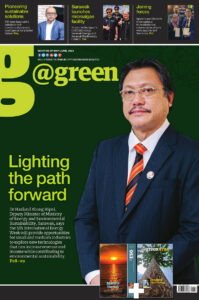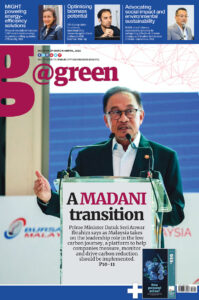SEDA Malaysia’s newly-appointed CEO gives an update on the country’s renewable energy progress and his aspirations to bring the industry to greater heights
In January 2021, Datuk Seri Dr Shamsul Anuar Nasarah, Minister of Energy and Natural Resources (KeTSA), announced the latest renewable energy (RE) target for Malaysia to be 31 per cent by 2025 and 40 per cent in 2035. The target is deemed achievable given the current progress of RE development in Malaysia.
Sustainable Energy Development Authority (SEDA) Malaysia CEO Dato’ Hamzah Hussin filled @green in on the current status of RE in Malaysia.
He said: “The estimated total installed energy capacity in Malaysia in 2020 consists of fossil at 76.55 per cent (Coal 36.13 per cent, Diesel 3.33 per cent, Natural Gas 36.08 per cent, others 1.02 per cent) and RE at 23.45 per cent installed capacity (Large Hydro 15.62 per cent, Biomass 1.94 per cent, Biogas 0.32 per cent, Small Hydro 1.39 per cent and Solar 4.18 per cent).
Along with SEDA Malaysia’s initiatives and plans for the industry, the data gave Hamzah the confidence that the RE industry was on the right track to achieve the national capacity target by 2025.
Malaysia’s RE capacity is helmed by programmes such as Large Scale Solar (LSS), self-consumption solar (SELCO), Feed-in Tariff (FiT) and Nett Energy Metering (NEM) programmes. While the Energy Commission (EC) manages the LSS and SELCO programmes, SEDA Malaysia is in charge of the FiT and NEM programme.
He shared that the FiT mechanism introduced in 2011 saw a cumulative approved capacity of 1,352.02MW from 10,464 applications as of April 2021. SEDA Malaysia was targeting to complete a total of 75MW from FiT projects from 18 Feed-In Approval Holders (FiAHs) in 2021.
“This year, SEDA Malaysia is conducting biogas, small hydro, and biomass e-biddings. The government, through SEDA Malaysia, will open applications for FiT quotas totalling 188MW for biogas, small hydro and biomass resources in Peninsular Malaysia in June 2021.
“A quota of 32MW was allocated for biogas, 126MW for small hydro and 30MW for biomass projects. The new FiT quotas would be able to generate RM1.5 billion in investments.
“It will also create 600 job opportunities in the RE industry,” Hamzah said, adding that the projects approved would begin generating and supplying electricity starting from mid-2024.
Aside from the FiT mechanism, the Authority is also continuing the successful NEM programme with a new allocation of 500MW quota through three sub-schemes for the latest NEM 3.0 offerings.
“NEM3.0 is a three-year programme commenced in phases starting from February 2021 until December 2023.”
The schemes are:
• the NEM Rakyat programme for residential systems, which will allocate 100 MW and grant a nett metering tariff over 10 years;
• the NEM GoMEn regime for government ministries and public entities, through which another 100 MW is assigned under the same conditions as the NEM Rakyat; and
• The 300 MW NOVA scheme or Nett Offset Virtual Aggregation will enable commercial and industrial PV system owners to sell excess power to the grid at average system marginal price (SMP).
As of May 19, 2021, a total of 9.33MW quota has been applied under the NEM Rakyat scheme. NEM GoMEn sees a 13.22MW applied, and NOVA has a 226.48MW quota applied so far.
The programme aims to enable more Malaysians, government agencies, houses of worship, and companies and local entrepreneurs to be part of the country’s renewable energy development and reduce their electricity bills to mitigate the impact of the Covid-19 pandemic.
Malaysia’s green progress, particularly in sustainable energy, is not complete without considering the energy efficiency and energy management effort in the equation. On this front, Hamzah intends to facilitate and advance the practice of energy management and energy efficiency (EE) in Malaysia, contributing to several low carbon development programmes. SEDA works together with KeTSA, the Energy Commission (ST), several State government and local authorities on this effort.
“There is more to be done to spread the awareness on adopting the EE efforts. SEDA has programmes running to further boost the EE practice in the country. They are the Sustainability Achieved Via Energy Efficiency (SAVE) 2.0, RMK 12 Energy Audit Conditional Grant (EACG) for Industrial and Commercial Sector and the Voluntary Sustainable Energy Low Carbon Building Facilitation and Assessment Programme.”
SAVE 2.0 is a programme by KeTSA introduced in January 2021 that offers RM200 e-rebate vouchers to domestic households that purchase energy-efficient air-conditioning units or refrigerators with four-star or five-star energy efficiency labels from ST in 2021.
The programme plans to encourage the public to buy energy-efficient appliances that will save consumer’s electricity consumption, especially for domestic consumers. The project’s implementation period has been set for one (1) year, from January to December 2021.
The rebate is available through Shopee, Lazada, and PG Mall online platform and registered electrical appliances stores nationwide. SAVE 2.0 was first revealed during the Budget 2021 announcement by the Finance Minister. A total of RM30mil was allocated to the program and is expected to benefit 150,000 households.
“As of April 2021, a total of 43,486 rebates quota has been redeemed with the savings enjoyed by buyers amounted to RM8,697,200.00. The voucher will be available until the end of this year, and we are hoping the public could take up this opportunity and enjoy a saving from their air conditioner or refrigerator purchase.”
Besides SAVE 2.0, SEDA Malaysia also conducts RMK-11 Energy Audit Conditional Grant (EACG) for Industrial and Commercial Sector to facilitate a systematic energy savings programme. The EACG programme provides a grant to industrial and commercial buildings to do an energy audit to identify the potential savings. Applicants agree to implement the energy-saving measures (ESM) as recommended by the Energy Service Company (ESCO).
The programme has helped raise awareness of potential energy savings and electricity costs in both sectors and further promote energy-efficient practices at every level of management. Due to the public’s positive response and its impact on the overall sustainable energy agenda, the programme is continued under the 12th Malaysia Plan (2021-2025). The programme was approved with a total allocation of RM86.73 million under the 12th Malaysia Plan.
Another initiative provided by SEDA Malaysia’s in-house experts is the Voluntary Sustainable Energy Low Carbon Building Facilitation and Assessment Programme. It offers technical services to building sectors such as consultancy and project management on Energy Efficiency/Energy Management programme that could be coupled with RE system, monitoring and verification (setting target and annual assessment), low carbon green building design input (new and retrofitting buildings), and Voluntary Sustainable Energy Low Carbon Building Assessment GreenPASS.
With the advances and integration of EE and RE system in the building sector, SEDA Malaysia collaborates with the Japanese Business Alliance Smart Energy Worldwide (JASE-W). The Authority is tasked with providing awareness and technical facilitation on zero energy building (ZEB) development, aligning with the global development of super sustainable energy low carbon building initiative and to support the low carbon or future carbon-neutral development programme.
On his future strategies for SEDA Malaysia, Hamzah shared he aspires to make the Authority the lead agency in sustainable energy (SE) in the country, advancing both the RE and EE industry through leadership and knowledge sharing, thus becoming a one-stop centre for all things SE.
A pledge to improve
Hamzah was also firm on achieving Malaysia’s Nationally Determined Contributions (NDC) targets utilising SE potentials.
“The Paris agreement saw participating countries pledge their own Nationally Determined Contributions (NDCs). Malaysia has pledged its greenhouse gas (GHG) emissions intensity of GDP by 45 per cent by 2030 relative to the emissions intensity of GDP in 2005.”
He said that this target was aligned to achieve a 31 per cent RE share in the national installed capacity mix by 2025. As the power generation sector is a significant contributor to Malaysia’s carbon footprint, accounting for 30 per cent of total carbon emissions, the realisation of the government’s vision is crucial in supporting the nation to achieve its NDC targets.
“SEDA Malaysia, as the implementing agency for FiT and NEM programmes, will do our best to ensure the success of the programme that will ultimately contribute to the clean energy generation. Our EE programme such as SAVE 2.0 and The Voluntary Sustainable Energy Low Carbon Building Facilitation and Assessment Programme will also help to contribute to the reduction of total carbon emission.”
— @green








